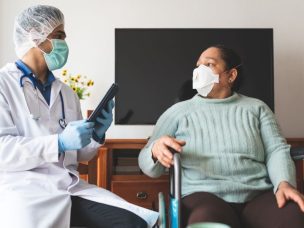Gastroenterology
Telehealth Visits Up in First Quarter of 2020 Versus 2019
FRIDAY, Oct. 30, 2020 (HealthDay News) — During the first quarter of 2020, there was a 50 percent increase in the number of telehealth visits compared with the same period in 2019, according to research published in the Oct. 30 issue of the U.S. Centers for Disease Control and Prevention Morbidity and Mortality Weekly Report....
Sleep Disorders Common Among Employees in Hospital System
FRIDAY, Oct. 30, 2020 (HealthDay News) — Sleep disorders are common among employees at a teaching hospital system and are associated with occupational burnout, according to a research letter published online Oct. 30 in JAMA Network Open. Matthew D. Weaver, Ph.D., from Brigham and Women’s Hospital in Boston, and colleagues examined the prevalence of sleep...
New Rule Requires Health Plans to Disclose Costs Up Front
THURSDAY, Oct. 29, 2020 (HealthDay News) — To make health care costs more transparent, the Trump administration will now require insurance companies to disclose actual prices for common tests and procedures, the Associated Press reported. The new regulations on insurers are designed to empower patients to become better consumers of health care and to help...
FBI Says U.S. Health Care System Under Ransomware Threat
THURSDAY, Oct. 29, 2020 (HealthDay News) — Government agencies are warning that cyberattacks on the U.S. health care system designed to lock up hospital information systems are occurring, the Associated Press reported Thursday. These attacks come at a time of rising cases of COVID-19 and could hurt patient care. In a warning issued Wednesday, the...
Decrease Seen in Non-COVID-19-Related Hospitalizations at Peak
TUESDAY, Oct. 27, 2020 (HealthDay News) — There was a decrease in the frequency of hospitalizations for non-COVID-19-related conditions during the COVID-19 pandemic and in the caseloads of common medical emergencies, according to two research letters published online Oct. 26 in JAMA Internal Medicine. Saul Blecker, M.D., from the NYU Grossman School of Medicine in...
Decrease Seen in Non-COVID-19-Related Hospitalizations at Peak
TUESDAY, Oct. 27, 2020 (HealthDay News) — There was a decrease in the frequency of hospitalizations for non-COVID-19-related conditions during the COVID-19 pandemic and in the caseloads of common medical emergencies, according to two research letters published online Oct. 26 in JAMA Internal Medicine. Saul Blecker, M.D., from the NYU Grossman School of Medicine in...
UEG: Pancreatic CA Down With Bariatric Sx for Obese With DM
FRIDAY, Oct. 16, 2020 (HealthDay News) — For patients with diabetes mellitus and obesity, bariatric surgery (BS) is associated with a reduced prevalence of pancreatic cancer compared with no BS, according to a study presented at UEG Week Virtual 2020, held Oct. 11 to 13. Aslam Syed, M.D., from Allegheny Health Network in Pittsburgh and...
Black, White, and Hispanic Pediatric Patients Receive Enemas for Constipation at Similar Rates
According to a study published in the Journal of the National Medical Association racial and health disparities do not appear to impact a physician’s decision on giving an enema to children with constipation presenting to the ED. The retrospective cross-sectional study utilized ED 2005-2016 data from the National Hospital Ambulatory Medical Care Survey (NHAMCS) in...
GI Complications More Common in Critically Ill With COVID-19
THURSDAY, Oct. 1, 2020 (HealthDay News) — A higher rate of gastrointestinal complications, including mesenteric ischemia, occurs among critically ill patients with COVID-19 versus matched patients without COVID-19, according to a research letter published online Sept. 24 in the Journal of the American Medical Association. Mohamad El Moheb, M.D., from Massachusetts General Hospital in Boston,...
More Medical News













